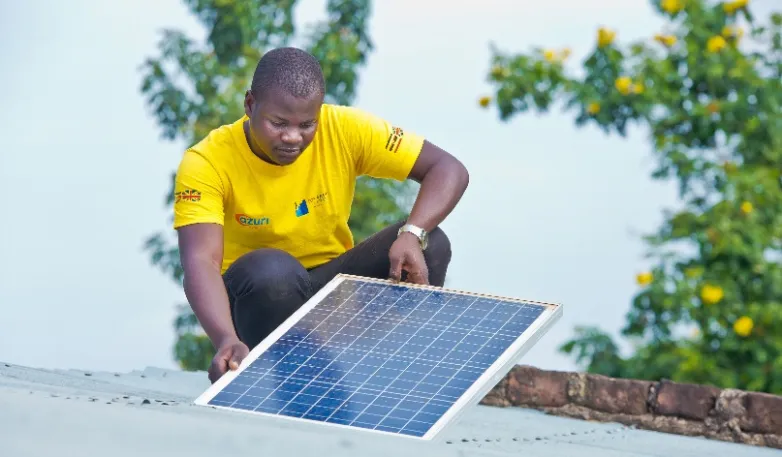Report: the commercial opportunity for off-grid solar power in Africa is $24 billion per year
- On a continent where 600 million people have no access to electricity, “The combination of solar and fintech is driving an economic transformation.”

The commercial opportunity for off-grid solar power in Africa is $24 billion per year, according to a report from Kleos Advisor.
This is the positive news and huge opportunity for a continent faced with inadequate access to an unstable and expensive grid, lack of transmission lines, and poverty. The World Bank estimates that more than 600 million Africans have no access to electricity.
A modernized, democratized electric grid on the continent seems an impossible challenge. The report notes that “even in densely populated cities, power connections are poor and the grid is unreliable. The situation is so severe in Lagos, Nigeria that many households have not one but two generators: a main generator for the household and a second back-up generator for essential services (e.g. water pumps and refrigeration) in case the first one breaks down.”
The report finds that off-grid resources provide “more than four times the level of power actually delivered by Nigeria’s national grid.”
If electricity, especially clean electricity, is going to come to those hundreds of millions living in rural and inadequately served regions — it’s going to come from off-grid sources and non-traditional means.
Energy firms and startups have introduced pay-as-you-go (known as PayGo), a model that combines solar panels and batteries with some financial innovation to allow first-time African consumers to possess a greener power source on a rent-to-own basis — with payments made by mobile phone. According to the report, the daily cost for the renewable power can equal the cost of buying kerosene for lighting and paying to recharge mobile phones.
Since 2012 and starting in East Africa, the PayGo method has been gaining popularity — with five million pay-as-you-go solar home systems sold in the last four years and over one million systems sold in the first six months of 2019, according to Kleos.
PayGo allows startups to tap into a population of potential customers that cannot pay for a system upfront — although it means the new companies must shoulder considerable debt on their balance sheet in a competitive market There have already been some corporate casualties such as Mobisol which filed for insolvency last year.
However, the Kleos report claims: “Given the ability of solar-fintech solutions to deliver power to African households along with the affordable financing to pay for it, solar could be the breakthrough technology that finally connects Africa’s vast off-grid communities.”
The World Bank-backed Lighting Global report finds that sales volume of PayGo products grew by 30% globally last year with revenues growing even faster, driven by consumers upgrading to more advanced solar systems instead of basic solar lamps.
Investments from Total, EDF, E.ON, Shell and other strategic investors in off-grid have grown in recent years, exceeding $2 billion globally on a cumulative basis through the first half of 2019, according to WoodMac.
Here are some of the companies operating in the off-grid PayGo market.
PEG Africa recently raised $5 million in subordinated junior debt, according to Forbes, bringing its total secured investment to $55 million. The firm claims 400,000 customers in Ghana, Cote d’Ivoire and Senegal, with funding from ElectriFI, a European electrification financing program for emerging markets.
Azuri has combined off-grid solar with energy-efficient TVs, rechargeable radios, internet access and other appliances for off-grid homes. Azuri employs more than 5,000 people across Africa and recently won a $26 million strategic investment from Marubeni and other investors.
Mitsubishi invested $50 million into U.K.-based BBOXX, a provider of PayGo solar home systems.
Zola Electric, an African renewable energy brand, raised $20 million in debt financing from SunFunder and a family office. Lyndon Rive, founder of SolarCity, is chairman of the board at Zola.
Solaris Off grid, with funding from the EnAccess Foundation, developed an open source communication protocol that aims to enable products with PayGo capability.
M-Kopa Solar is backed by a long list of impact and equity investors with efforts in Kenya, Nigeria and Uganda.
There are still obstacles for the PayGo model, including a lack of credit history from these potential customers.
Still, the technology and the business model does enable users to build credit profiles. Azuri Technologies estimates that out of Africa’s five million PayGo customers, around two million have fully paid off their systems — meaning that 10 million Africans are receiving free electricity in their homes in as little as a year-and-a-half on the PayGo program.
Renewables make up less than 1% of Africa’s grid-energy mix with 50% from oil, gas and coal and the rest from biomass, according to the IEA.
Download report:
The_grid_wont_connect_Africa_but_solar_can_Kleos_Advisory_Report_1_2020
Read more
https://www.azuri-group.com/wp-content/uploads/2020/01/The_grid_wont_connect_Africa_but_solar_can_Kleos_Advisory_Report_1_2020.pdf
Also read

